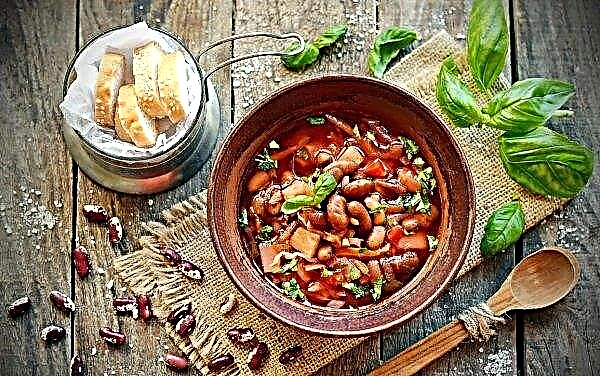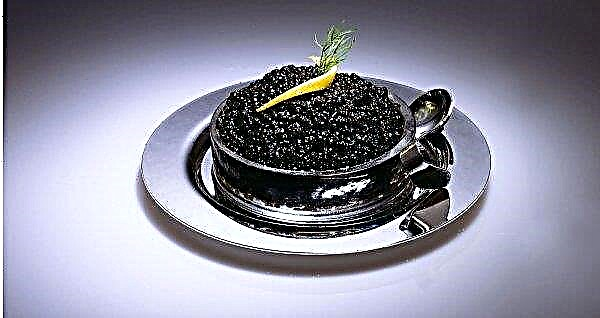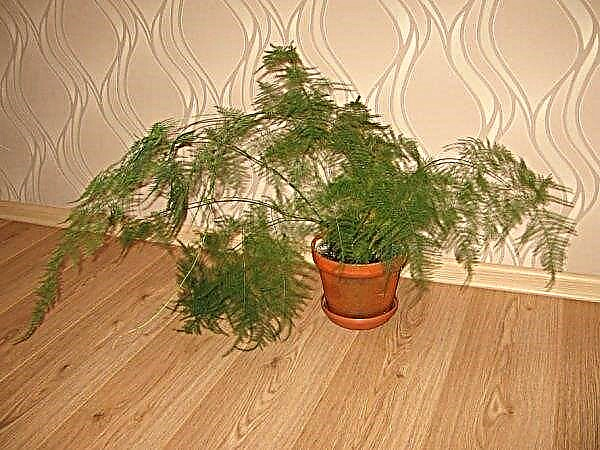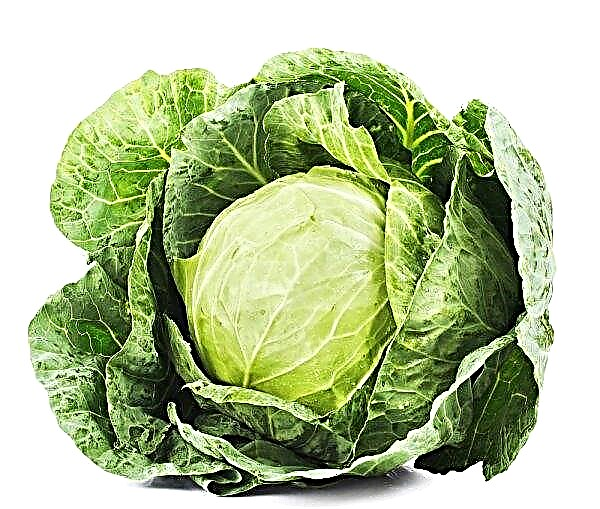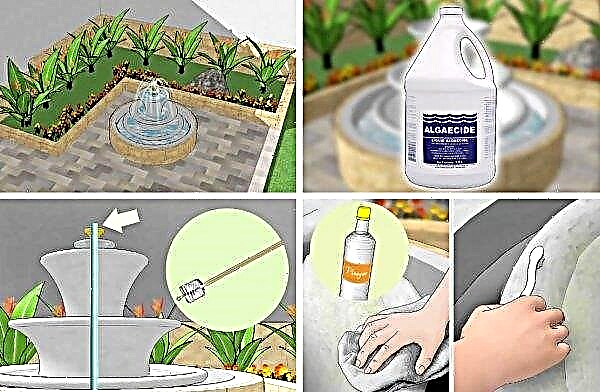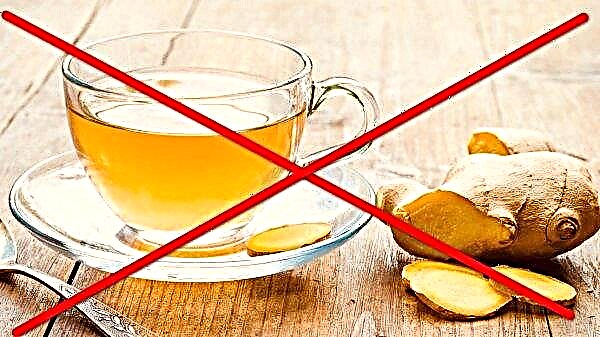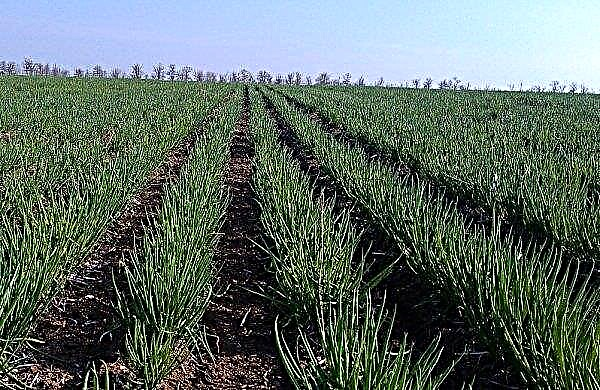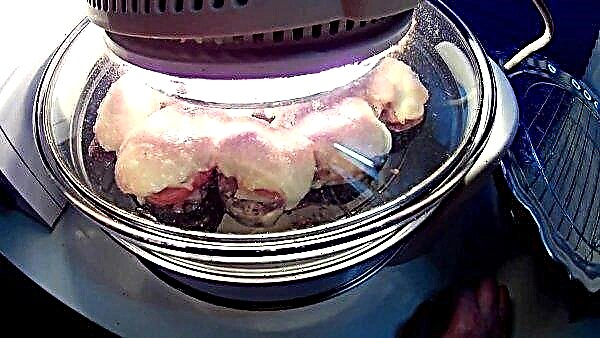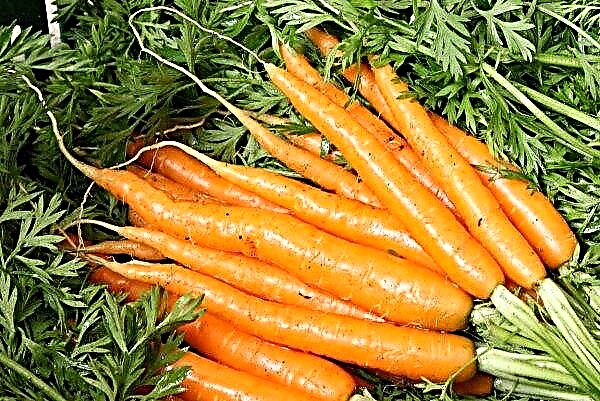Coriander is a famous spice widely used in the culinary of countries of the world. However, few people know that, in addition to the aroma that can enrich any dish, the seeds of this plant have a number of medicinal properties, so they are widely used in medicine, and not only folk, but also official. The secrets that coriander grains conceal within themselves will be discussed in the review.
Chemical composition
Coriander (Latin name of the plant Coriandrum sativum) belongs to the family of umbellate. Its fruits are fractional capsules of a round or oval shape and a solid ribbed structure, consisting of two seeds.
Coriander is rich in vitamins, minerals, dietary fiber, essential oils, pectins, alkaloids, phytosterols, organic acids, aldehydes, as well as fatty acids, including saturated, monounsaturated (Omega-9) and polyunsaturated (Omega-6).Did you know? Coriander and cilantro are the same plant, but in the first case we are talking about seeds, and in the second - about green shoots with leaves.
Vitamins that make up cilantro fruits:
- carotene;
- vitamin C;
- thiamine;
- riboflavin;
- a nicotinic acid;
- phylloquinone;
- routine.
Of the trace elements present in the plant, the most interesting are:
- calcium;
- magnesium;
- phosphorus;
- iron;
- manganese;
- copper;
- selenium;
- zinc.
Essential oil, which gives a characteristic smell to coriander seeds, is named after the plant "coriander". Linalool, a volatile alcohol with lily of the valley aroma, is isolated from this steroid compound, and from it, in turn, another terpenoid is geraniol.  Both of these substances are widely used in perfumes. In addition to them, other isomeric organic compounds are present in the composition of coriander essential oil, such as pinene, terpinene, fellandren and borneol. The most valuable fatty acids in plant seeds are linoleic, stearic, oleic, ozoleic, myristic and palmitic.
Both of these substances are widely used in perfumes. In addition to them, other isomeric organic compounds are present in the composition of coriander essential oil, such as pinene, terpinene, fellandren and borneol. The most valuable fatty acids in plant seeds are linoleic, stearic, oleic, ozoleic, myristic and palmitic.
Important! Pure coriander essential oil in its pure form has a sharp aroma and bitter taste, however, in small doses, the smell and taste of this substance become delicate and delicate. That is why the spice should be used carefully so as not to spoil the dish.
Healing properties
The biologically active substances that make up coriander seeds have the following healing properties:
- antioxidant (remove decay products, toxins and other harmful substances from the body, promote cell regeneration);
- disinfecting;
- analgesic;
- antispasmodic;
- anti-inflammatory;
- hemostatic;
- choleretic;
- sweatshops;
- diuretics;
- carminative (reducing gas formation in the stomach);
- wound healing;
- mucolytic (expectorant, secretolytic);
- antiseptic (antibacterial);
- decongestant;
- metabolic (stimulate the gastrointestinal tract);
- anthelmintic (used mainly in veterinary medicine);
- laxatives, moreover, mild and gentle (it is interesting that coriander fruits are also indicated for diarrhea, since they enhance intestinal motility, in particular, they stimulate the absorption functions of the small intestine and, thus, accelerate recovery);
- soothing (for the nervous system) and tonic (for the work of the heart and blood vessels);
- immunostimulating and general strengthening (due to the high content of ascorbic acid in combination with rutin);
- hematopoietic (increase the level of hemoglobin in the blood, improve its composition).

- The use of coriander seeds, not even in the form of tinctures or decoctions, but as a seasoning for meat or vegetable dishes, provides:
- normalization of blood pressure;
- improvement of the nervous system and the brain;
- lowering the level of bad cholesterol in the blood;
- improved appetite (due to the active secretion of gastric juice);
- prevention of a feeling of heaviness in the stomach, heartburn, belching and constipation;
- stimulation of the liver and kidneys;
- skin condition improvement;
- increased libido (cilantro and its seeds can be attributed to the group of natural aphrodisiacs).
Did you know? Henri Leclerc, French doctor and adept of herbal medicine, in the late XIX - early XX centuries. widely used cilantro seeds to restore the intestinal microflora of patients who had typhoid fever, gastroenteritis, and rotovirus infection.
Application in traditional medicine
Traditional medicine has long considered the fruits of coriander as a remedy for gastrointestinal and nervous disorders.

In addition, they were used to treat:
- wounds and skin diseases, including allergic dermatitis and rashes (as an antiseptic, analgesic and regenerating agent);
- rheumatism;
- asthma
- conjunctivitis, keratitis and other diseases of the organs of vision;
- nosebleeds;
- genital herpes;
- urolithiasis;
- gallbladder inflammation;
- renal failure;
- pyelonephritis;
- Gospel disease (jaundice);
- headache;
- infections caused by helminths and other parasites.
However, there are a number of indications according to which coriander can be especially useful for women and men, in addition, the seeds of this plant help to cope with some childhood ailments without the help of "heavy" medications.Did you know? The pungent smell of the essential oils rich in cilantro seeds scares off many insects and other protozoa. The crushed seeds in bags, laid out in secluded places, are a proven remedy for moths or small ants.
For women
The analgesic and soothing properties of cilantro fruits help relieve the discomfort associated with premenstrual tension syndrome, as well as pain that occurs in the first days of menstruation. A similar analgesic and relaxing effect of the seeds of the plant manifests itself positively during menopause.
Many women are familiar with a disease such as cystitis. It turns out that inflammation of the bladder can also be cured with the help of coriander seeds. Due to the cleansing of the kidneys and urinary tract, the plant helps eliminate the infection, quickly removes the symptoms of painful or difficult urination.

The stimulating effect exerted by the fruits of cilantro on the gastrointestinal tract makes them a dietary supplement for planned weight loss - without strict diets and exhausting workouts. Of great importance is the ability of coriander to accelerate metabolic processes in the body, to promote the burning of fat and the removal of excess fluid.
Coriander seeds are also used in home cosmetology. They include hair masks, home exfoliating products, skin care products. In some sources, you can come across a warning about the inadmissibility of eating cilantro and coriander seeds during pregnancy.
Did you know? The girl has long used the whitening properties of cilantro seeds to combat freckles. The fruits were brewed, and the face was washed daily with the obtained elixir.
In fact, the side effects that the plant can cause (for example, blood clotting and thrombosis) manifest themselves only at high dosages, but the hemostatic, decongestant, soothing qualities of cilantro for a future mother are useful in the same way as the property of coriander to eliminate nausea, heartburn , fight constipation and improve bowel motility.
As for the period of breastfeeding, at this time, cilantro for a young mother is not only possible, but also necessary, since both the leaves and seeds of the plant stimulate the production of breast milk.
For children and newborns
The beneficial properties of coriander can also be used to treat the baby. For example, as a remedy for such an unpleasant phenomenon in infants as colic. It should be borne in mind that the nature of infant colic has not yet been studied by medicine, however, according to the World Health Organization, this condition does not need treatment and disappears within a few months by itself.

In addition to colic, cilantro seeds, or rather, the essential oil included in their composition, is a proven cough suppressant. It is enough to add a few drops in hot water and use it for inhalation. Nevertheless, using this procedure, you need to be careful that the child does not have a burn of the respiratory tract.
As for the internal intake of coriander in the treatment of colds in infants, such drugs can not be used until the child reaches the age of two, since any mucolytic drugs are contraindicated for such children because of the high risk of side effects. For the same reason, before giving coriander to older children, it is better to consult with your doctor.
Another caveat is associated with the treatment of jaundice. Coriander, especially as part of special collections, in folk medicine is often used to reduce the amount of bilirubin in the blood and normalize the color of the skin and mucous membranes. However, jaundice of newborns, although associated with an increased content of bilirubin, cannot be treated with such drugs.Important! Sputum thinners are officially prohibited in the treatment of children under 2 years old in many European countries. The reason is the high likelihood of serious complications in the work of the respiratory system, directly related to the use of such drugs.
At the same time, with stomatitis, pharyngitis and other diseases accompanied by the appearance of mouth ulcers, a decoction of coriander grains can significantly improve the condition of the child if you use this tool to rinse your mouth.
For men
Members of the stronger sex know cilantro as a proven tool for improving potency. It turns out that this quality of the plant is due to its component, androsterone. This hormone is the main product of testosterone metabolism and directly contributes to the activation of male sexual function, as well as a more vivid manifestation of secondary sexual characteristics.

Thanks to the same substance, sperm quality is improved, sperm motility is increased, and, therefore, decoctions and infusions from coriander seeds should be regularly taken by men in pairs having problems conceiving. In addition to impotence, cilantro helps in the treatment of two more purely "male" diseases - hemorrhoids and prostatitis.
Harm and contraindications
There are not so many direct contraindications for coriander, but abuse of spice can lead to negative consequences.
With caution and only after consultation with the attending physician, taking preparations based on cilantro fruits should be used when:
- cholecystitis;
- coronary heart disease;
- recently suffered a heart attack;
- hypertension
- ulcer, gastritis or pancreatitis against the background of increased acidity of gastric juice;
- thrombophlebitis or increased blood clotting;
- diabetes mellitus;
- severe kidney disease or unexplained nature.
The foregoing relates to the use of coriander fruits for medicinal purposes, as a culinary seasoning, these seeds are contraindicated in case of individual intolerance to any of the plant components. Overdoses, in particular, the use of more than 1 tsp. seeds per day or using undiluted coriander essential oil (even as an external remedy) can lead to side effects.
- They appear as follows:
- skin irritation;
- menstrual irregularities;
- jumps in blood pressure and other problems of the cardiovascular system;
- malfunctions of the brain and nervous system (impaired memory, insomnia and even stuttering);
- inhibition of kidney function.

Procurement and storage of raw materials
Finished coriander fruits can be purchased at a store or market.
When choosing a product, you should be guided by several simple rules:
- Acquire only whole fruits. In ground form, coriander is much more aromatic, however, seeds need to be crushed immediately before use, otherwise many of the most valuable plant components will quickly disappear and the useful properties of the raw materials will be lost. In addition, it is easier to add stabilizers, preservatives and other “chemistry” to powder spices that are incompatible with the therapeutic goals of using the product.
- Give preference to products Packed in laminated foil paper or glass, with a hermetically sealed lid.
- Check expiration date - a mandatory rule for any purchase. High-quality raw materials should not be stored for more than six months, if the packaging indicates a longer period, this indicates the seller’s dishonesty.
- If you can inspect, smell and taste the seeds, you need to use it. High-quality raw materials should be dry and clean, have a uniform color - brown, yellowish-brown or greenish. Individual seeds should not stick together, they can not be any inclusions, traces of spoilage, damage or mold. Another reason to refuse a purchase is the presence of single black copies in a batch. The aroma of the kernel ground between the fingers is always bright and persistent, when cracking the seeds, a pleasant, but distinct bitterness should be felt.
Did you know? The well-known "dill water" is prepared not from dill, as many people think, but from fennel. An analogue of the product in Germany is tea for babies, in which, in addition to fennel, caraway and coriander are added.
Those who managed to grow cilantro in their own area can carry out the harvesting of seeds on their own. Their collection should be carried out at a time when from one third to half of the fruits in the umbrellas have acquired a brown color, and it is necessary to cut off the entire umbrella as a whole. Immediately after collection, the umbrellas are laid out in one layer on a paper towel or soft cloth and left in a place protected from direct sunlight, but well ventilated, for complete drying.
After drying, you can proceed to threshing (fruit extraction). Depending on the volumes, this can be done manually or using special equipment, however, in any case, it is important to ensure that the integrity of the fruits is not violated. The amount of essential oil in coriander seeds decreases as it ripens, but for the proper use of raw materials, a metered content of this aromatic substance is necessary.

Another amazing property of cilantro seeds is that when dried, they open up the aroma more deeply during storage. And vice versa: in raw seeds, essential oil quickly loses a pleasant smell, its components are oxidized, and the raw material becomes unusable.
You need to store prepared seeds in the same way as any spices and medicinal herbs - in glass containers under a tight lid, placed in a dry and dark place. The shelf life, as already mentioned, is six months.
Did you know? According to one version, the word "coriander" came from the ancient Greek "κόρις", that is, "bug". The young plant, indeed, has a pronounced and unpleasant odor, similar to miasma emitted by this small bloodsucker.
How to cook coriander seeds?
For medicinal purposes, coriander seeds are used in different ways, for example:
- juice is squeezed out of them to stop bleeding;
- for the treatment of wounds and cuts, the damaged area is sprinkled with crushed grains;
- with rheumatism mixed with honey and used as an ointment;
- with a stomach ulcer, grind with the roots of elecampane, as well as sea buckthorn cake and eat the resulting slurry, washed down with water;
- for depression and colds, grind and mix with dry red wine.
However, the most common ways to use cilantro fruits as a medicinal raw material are decoctions, tinctures and infusions.

Decoction
To prepare a classic decoction of coriander seeds, you must:
- Grind 1 tbsp. fruits in a mortar.
- Pour the prepared raw materials with 1 cup of freshly boiled water.
- Bring to a boil, simmer over low heat for 10 minutes.
- Cover the container and allow the liquid to cool completely.
- Strain the contents through cheesecloth.
Such a tool can be used in pure form or in combination with other medicinal ingredients, including when:
- constipation: inside, three times a day, 50 ml;
- conjunctivitis: for washing the eyes, up to five times a day;
- hemorrhoids: inside, daily at 125 ml at bedtime (preferably in combination with yarrow, buckthorn bark, licorice root and cassia leaf - all ingredients for the decoction are used in equal proportions, the volume of water increases in proportion to the amount of dry components);
- gallbladder inflammation and jaundice: 125 ml three times a day for 20 minutes before eating (you can add 1 hour of watch leaves and caraway seeds to it when preparing the broth);
- menopause: 30-day courses with a weekly break - inside 100 ml three times a day;
- cystitis: 7-day course with daily drinking in several doses of 1 liter of decoction;
- headaches: hot, as an inhalation;
- colds: 125 ml of broth 3-4 times a day (you can add crushed ginger root).
Tincture
To prepare tincture of cilantro seeds, you must:
- Grind 1 tbsp. fruit and pour into a container with a tight-fitting lid.
- Pour in raw materials 100 g of vodka.
- Close the lid, put the container in a dark place for 2 weeks. Shake the liquid periodically.
- After a while, strain.

As an alternative, cilantro seeds can be infused with red wine, but in this case, you should be guided by other proportions: for 1 liter of wine you need to take 100 g of chopped fruits. Such a tincture is considered finished after a week.
Alcohol tinctures of cilantro are more often used as a remedy for insomnia or the common cold. In the first case, the elixir should be drunk before bedtime, in the second - twice a day. A single dose of vodka tincture is 30 ml, wine - 125 ml.
Infusion
In addition to tincture, an infusion is prepared from the fruits of coriander. To do this, just pour 1 tbsp. seeds with a glass of boiling water, cover, soak until completely cooled and then strain. Like a decoction, such a tool is not stored for a long time, in extreme cases - 2-3 days in the refrigerator. The usual therapeutic dose is 250 ml, as a rule, it is recommended to drink the infusion after a meal.
We invite you to familiarize yourself

The infusion is used for:
- relieving menstrual, headache and stomach pains;
- vision improvement (strengthening the eye muscles);
- treating diarrhea, flatulence, and other bowel problems;
- normalize blood sugar;
- rinsing the mouth with periodontal disease and stomatitis;
- decrease swelling;
- improve appetite (in this case, the drug must be drunk before meals).
The fruits of coriander are much more than ordinary spices. With proper use, they can be a salvation from many unpleasant conditions, not inferior in healing properties to the most famous medicinal plants. However, resorting to traditional medicine, one should not forget that for the treatment of truly dangerous diseases, such drugs should be considered solely as an addition to professional therapeutic care, but not replace it.

